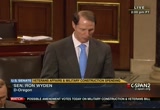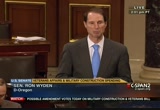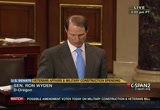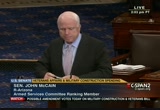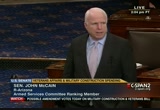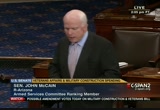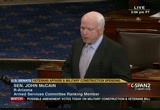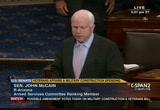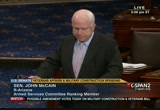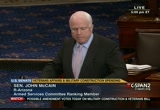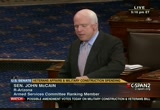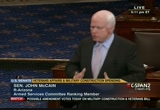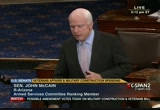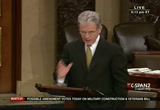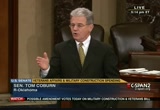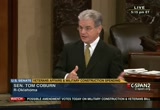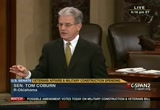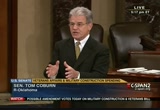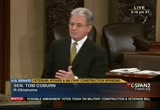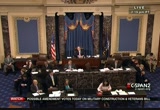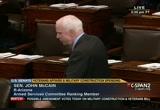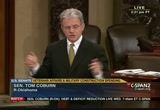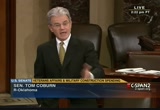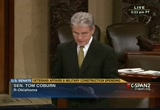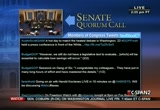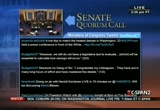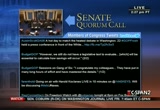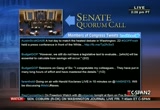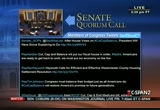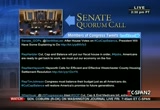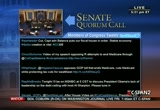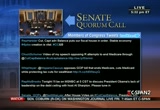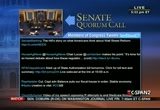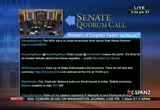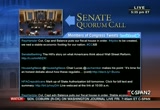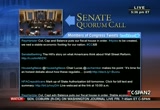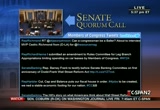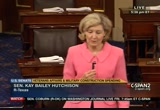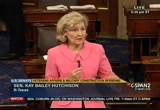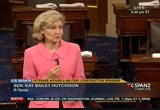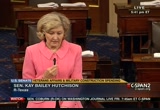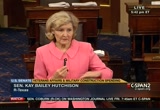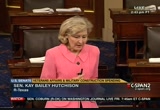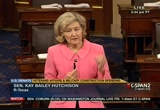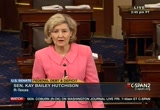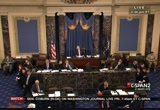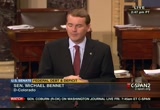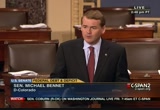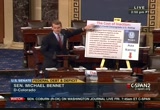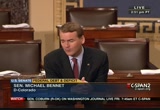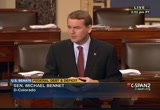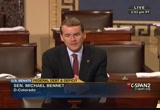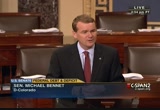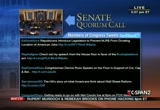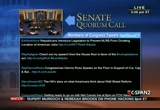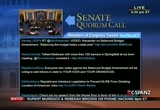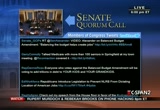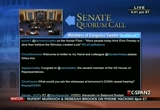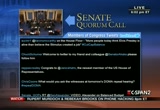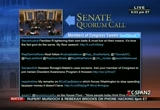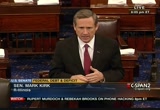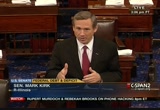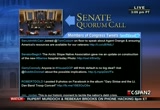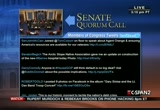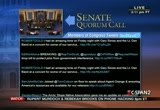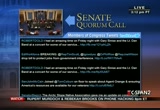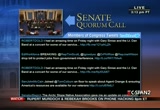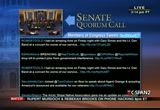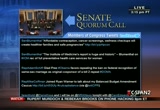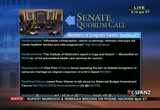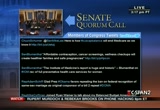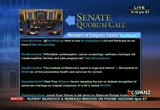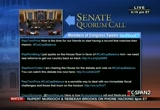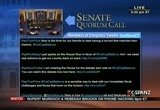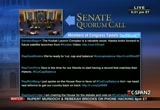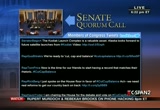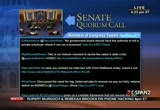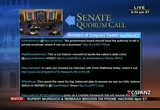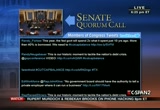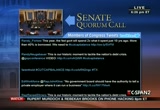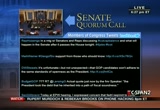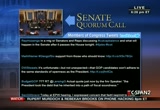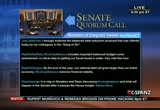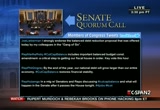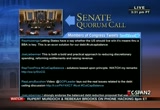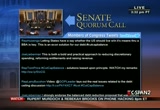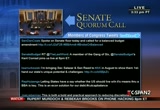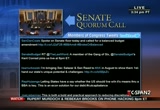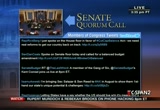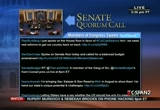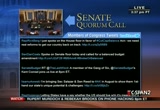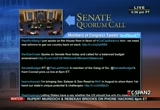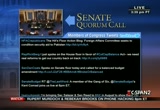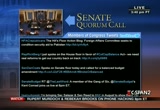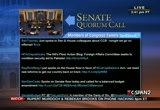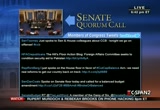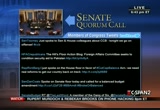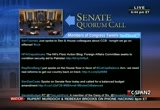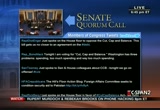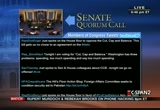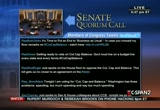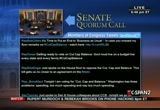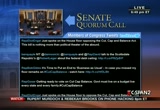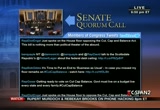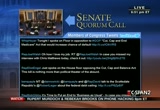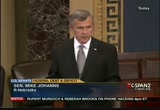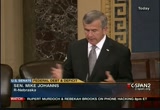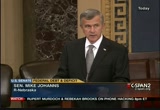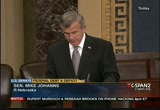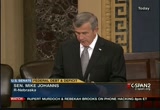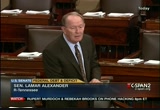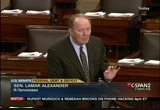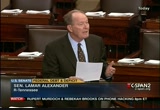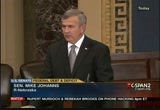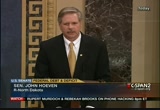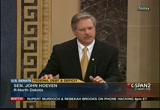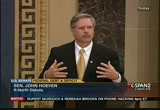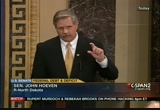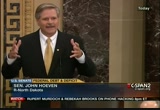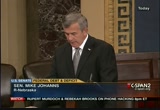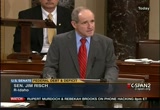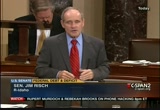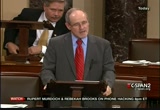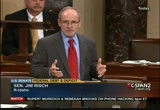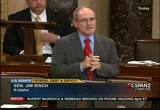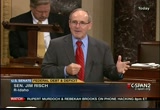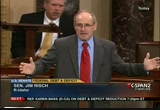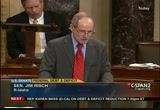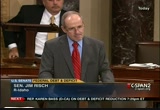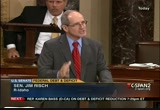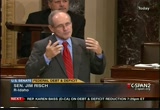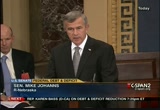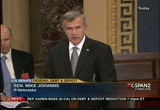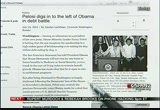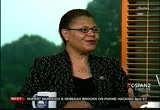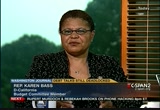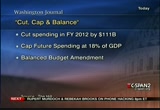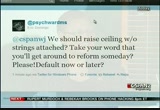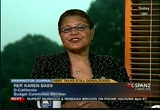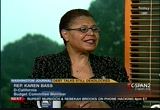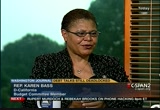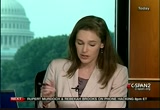tv U.S. Senate CSPAN July 19, 2011 5:00pm-8:00pm EDT
5:00 pm
actions." unquote. therefore, the commission took the secretary of defense's recommendation, closed yumatilla chemical depot and changed it on completion of the chemical demille tarrization mission, in accordance the treaty operations closed umatilla depot. these facts make it clear the pentagon did not make additional recommendation that the facility only be closed if the chemical demilitarizeation mission is completed by december of 2011. rather, the commission acknowledged that the closure will have to happen when the demilitarizeation mission is completed even if that is after september of 2011. and that decision by the commission became law. it is also important to note that the commission was aware that the demilitarizeation
5:01 pm
mission had a deadline of its own. under the terms of the treaty, umatilla must complete the mission by april 29, 2012. umdc will meet this deadline if not beat it. the commission was not giving authority for umdc to be one of a never-ending nature. they were simply giving umdc the additional eight months provided under the chemical weapons convention. the depo should be closed under brac so that the will of the community in the form of the local reuse authority and the will of congress and the brac law will be taken into account. i strongly believe that the local community should decide what to do with the land and not somebody who is off in the basement of the pentagon. mr. president, i have spoken with secretary panetta about this matter, and he is fully supportive of our efforts.
5:02 pm
i want to also thank senator johnson and my good friend from arizona, senator mccain, who have also been very helpful, and their staff, in working with us. the pentagon has to implement the law as it is, not, in my view, as it wants to be. but seupbts lawyers at the pentagon have -- but since the lawyers at the pentagon have in recent weeks thought there has been ambiguity, i wanted to clarify it for them with the amendment that has been modified with the good counsel of the staff of senator mccain. let me also say the staff of senator mccain has been very helpful in saying that this would be permissive authority in terms of the pentagon and that the senator could join me in a letter making it clear that it is important that this be moved
5:03 pm
expeditiously. soy hope we can complete this matter at this time, mr. president. my amendment which i offer on behalf of myself and my colleague, senator merkley, would allow the pentagon to follow the brac commission's report and close the umatilla depo under brac. mr. president, with that, i would yield the floor. mr. mccain: mr. president? the presiding officer: the senator from arizona. mr. mccain: mr. president, can i say, first of all, i want to thank the senator from oregon. this is an issue that needs to be resolved. it's been a pleasure working with him in not only behalf of the people of oregon, but also on behalf of the department of defense. mr. president, i join the senator from oklahoma in supporting the amendment which senator coburn had intended to
5:04 pm
propose. the amendment would have amended public law 102-4, the agent orange act of 1991 which i cosponsored to provide clarity on the factual basis required of the secretary of veterans affairs to make future determinations on the presumption of connection of military service in vietnam with diseases associated with exposure to the herbicide commonly known as agent orange. now, mr. president, agent orange was an unanticipated and certainly not something that at the time, given the scientific knowledge and information we had, that would be detrimental to the health of the men and women who were serving in the vietnam war. but the fact is agent orange did have a very serious health effect on the men and women who were serving and those who came
5:05 pm
in contact with it. and for years we delayed compensating our veterans for those who were exposed to agent orange. in 1991 the act was a long overdue answer to questions of the health effects of exposure to agent orange. it directed much deserved compensation to our veterans for certain is diseases, including non-hodgkin's, lymphoma, and certain cancers. well, what's happened and the reason why i appreciate the senator from oklahoma raising this issue, is that it's obviously now reached a point where the secretary of veterans affairs has now expanded the eligibility to the point where it is beyond any scientific evidence that this, that
5:06 pm
compensation would be required. in 2008 -- 2006 it was found that the evidence linking heart disease to pokes sure to herbicides -- to exposure to herbicides was inefficient. heart disease is the leading cause of death in america today and has been so for decades. in 2008, they updated their findings based on two epidemiological studies which provided -- quote -- "statistical evidence of a relationship." still it was categories, the link between eschemic heart disease and pokes sure to agent orange which suggests limited association. that was further qualified with the following statement: e.p.a. deem logical evidence -- epidemiological evidence suggests an association between exposure to herbicides and the outcome but a firm conclusion is
5:07 pm
limited because chance and bias could not be ruled out with confidence. despite this doubt, the secretary of veterans affairs decideed to grant a new presumption for eschemic heart disease which according to the department of veterans affairs will cost nearly $31.9 billion over the next ten years. similarly with parkinson's disease, which was also found to be in the category of limited or suggestive evidence. a decision was made to grant compensation and benefits based on exposure to agent orange which according to the v.a., will cost $3.5 billion over the next ten years. this process is risky, hit or miss and a costly way to administer the veterans disability program, and resources which are in scarce supply and which our veterans need and deserve in return for their sacrifice to our nation. in its report to the congressionally mandated
5:08 pm
veterans disability commission in 2007, the institute of medicine itself found that the association standard contained in the agent orange act was inadequate and potentially misleading. that report recommended the goal of the presumptive disability decision-making process be to ensure compensation for veterans whose diseases are caused by military service and a new primary standard that sufficient evidence to support a determination of presumption would exist when evidence is sufficient to conclude that a causal relationship exists. the veterans disability benefits commission endorsed the need for establishing a new framework for presumptions with more transparent processes, but it failed to take the full step of embracing causality and decision making. the amendment that my colleague from oklahoma so bravely has
5:09 pm
intended to offer would have achieved the goal identified by the institute of medicine to ensure that scientifically based causeality is at the heart of the disability determination process. my vote in favor of the agent orange act of 1991 was a vote to discern facts from rhetoric and even politics and put the welfare of our veterans above all other considerations, including costs. my support of the coburn amendment would be no different. it's appropriate to adopt a clearer, stronger standard for the presumption of service-connected disabilities to ensure greater consistency in this process. and in doing so, help ensure that our nation's resources are available to provide appropriate compensation and benefits for veterans of wars to come. former secretary of veterans affairs, the honorable tony principi, before the senate veterans' affairs committee on september 23, 2010, on this very
5:10 pm
subject, the subject of presumptive disability is decision-making, said -- and i quote -- "make no mistake, these decisions do not merely affect those who may or may not receive presumptive service connections and their families. the american people watch these decisions closely, all to ensure that those who have defended our nation while in uniform are treated fairly and to ensure that those who have been given the responsibility to administer the program are good stewards of the resources with which they have been entrusted. if the american people lose faith in the integrity of our disability benefits systems, veterans and their families will be the ones who suffer. the surest way for that to happen is for the public to be convinced that presumptive service-connection decisions are based on anything other than sound scientific advice." mr. president, there is no sound scientific advice that indicates
5:11 pm
that many of these decisions are valid and directly connected to exposure to agent orange. and i urge the chairman of the committee to look into this issue. we're talking about $13 billion and another $3.5 billion which may not be necessary to be spent. and so, i believe and understand the emotion associated with the issue of agent orange, because for so many years our nation neglected -- it wasn't benign neglect. it was neglect -- the plight of those who were exposed to agent orange and the terrible physical problems that ensued as a result of that exposure. but now it's pretty clear that the secretary of veterans affairs has gone way over in the opposite direction and saying
5:12 pm
giving presumptive service connection when there is no valid scientific evidence to convince me that that kind of eligibility is there. so i want to thank my colleague from oklahoma. i urge the senator, the distinguished chairman of the veterans' affairs committee, to look at this issue, look at whether these $13 billion or $16.5 billion -- excuse me -- $31.9 billion plus $3.5 billion over the next ten years are wisely spent. and that doesn't mean that we don't provide disability payments to those who actually have been exposed and need it. but there is a lack of scientific evidence that many of the benefits that are being extended are absolutely warranted. so i know that the senator from oklahoma will not be proposing
5:13 pm
this amendment, and i understand that. but i want to assure the committee chairman that when we're talking about this kind of money, we need to investigate it very seriously and reach decisions which are in the best interest of our veterans. there are veterans out there who need compensation and every day, unfortunately, we are having young men and women return from the battlefield that have disabilities from the result of serving our nation in combat. i hope that the senator, the chairman of the committee will look at this issue very seriously. mr. chairman, i yield the floor -- mr. president, i yield the floor. mr. coburn: mr. president? the presiding officer: the senator from oklahoma. mr. coburn: let me update my colleague. do i plan to call up this amendment, and i do plan to ask for a vote on it because it is important. what has happened -- and i'll call the amendment up in a moment. what has happened?
5:14 pm
the senator from arizona has had the disease melanoma, cancerous melanoma, at his age. and we kind of know somebody at his age, if they have large amounts of sun exposure over long periods of time on birth marks you can develop medical know massachusetts there is causation re -- you can develop melanoma. i've also had melanoma and what science also knows is you can develop it without exposure. what happened in the v.a. is we've taken and gotten way from causation and gone to any association that could ever be made. we also know i'm a survivor of colon cancer. what we know is your risk for colon cancer goes way up if you eat a highly refined diet, very
5:15 pm
few vegetables and have that kind of a diet associated with also high levels of sugar. i didn't have any of those things, but yet i had colon cancer. because there's an association, you can't infer causation. so what is really happening now? the secretary of of veterans affairs has put us on the hook for people who have no causation but do have association. this amendment, which i will call up, doesn't change our ability to do that in the future when we in fact would see causation. but the pro presumption that association caused my -- the sun caused my melanoma is wrofnlgatessumption that my diet caused my mosquito leon cancer is wrong. it does cause colon cancers, but
5:16 pm
you can't show cause aismtion so nobody can speak for veterans better than john mccain having served the amount of time that he did in vietnam as a prisoner of war. he has the body image that shows his sacrifice. but let me tell you what's -- but let me tell you what's happened. we're transferring half a million dollars to veterans under this decision by secretary shinseki for people who weigh 3w50 pounds, smoke three packs of cigarettes a day and have hyper cholesterol because they won't take their med sainsdz we're saight reason they have heart disease is because at some point in time they were in vietnam. because they've moved from causation to association. and i can think of nothing unfair to those that are truly needing the benefit of this than to give the benefit for somebody whose lifestyle absolutely
5:17 pm
caused their heart disease and there's no association with dioxin or agent or arrange the active ingredient which causes disease, which we know several of them actually did, but now we've moved to a whole, new level where we're saying, if you were exposed both above or in vietnam and you have any of these other diseases which has listed, that there can be an association. and let me remind you, an association doesn't prove anything about cause. it just says there's a statistical out here and it may be in fact right or it may not in fact be right. all the evidence is the other way. and the secretary has chosen to send $42 billion, counting last year and this year, on this program for diseases that cannot caused by agent orange. i would just say, how is that
5:18 pm
fair? how is it fair to the people that are administering this? i foindz out about it because the v.a. -- i found out about it because v.a. workers called my office and said, this can't be right. what are you all doing? why are you giving money to people that ho had no association with the disease -- who had no association with the disease caused by that but yet you're paying them out of the money that should be reserved for people that have real disease caused by agent orange. we don't have to pay people money. another interesting factor, i have a brother that has idiopathic pan create ice. urpdz this new guidance, he can be eligible for agent orange compensation and he served in korea. and because he has a chronic disease now, they're lining him to get payment from the v.a. because he has idiopathic pan
5:19 pm
cree tight is and he's going to get approved. and there's absolutely no association for causation with that. but yet that's what's happened. so i would ask unanimous consent that amendment 564 be called up and the pend pg allot be set aside. the presiding officer: is there objection? without objection. a senator: mr. the gentleman -- the presiding officer: the clerk will report. cleric mr. coburn proposes amendment be numbered 564. mr. coburn: i would ask the amendment be considered as read. the presiding officer: without objection. burn binder yield to thmr. cobue senator. mr. mccain: i'd like to make it clear in this amendment that there is no desire to deprive someone who was actually exposed to this herbicide called agent orange and suffered physical
5:20 pm
consequences as a result of it. that this amendment basically draws a difference between three words. one is "causation," which is generally the criteria used in any of these cases, the causation. and that would replace the current -- quote -- "positive association." as you have just described, positive association could be most any encounter that anyone would have had who served. i always thought that it would be in vietnam. now you tell me it's even added to someone who served in korea. but isn't it true, we are not trying here to deprive anyone who legitimately was exposed to agent orange and shows the causation, that they are entitled to benefits from the taxpayers of america?
5:21 pm
what we're talking about here, isn't it true, is that -- quote -- "positive association" to such an amorphous kind of definition that it leads to an enormous waste of taxpayers' dollars? while there are veterans out there that are in need of these taxpayers' dollars for their legitimate reasons? mr. coburn: i'd answer the senator's question is that's absolutely correct. we do have a lot of science that shows causation with this herbicide and disease. we have made the assumption that anybody -- any other association should fall into that same category. and so we know leukemia, we know lots of things. in this group, which there are only an association, statistic cal association, no correlation, no causation, if you have
5:22 pm
parkinson's, you're compensated for agent orange. and yet there is not one scientific study that will show a causal relationship between those two diseases. so i would come back and ains. i want every veteran to get the compensation that's due them who have a disease that's related to this. and if we find in the future more signs that would say we go on the science. but what we're doing now is wheef a secretary who doesn't understand the difference between association and causation and we're going to spend $42 billion that we don't have giving it to people whose disease was into th not caused g agent orange. that's my significant problem. as a physician, i could never defend myself in a court of law using this logic on anything i would do as practicing medicine. as stated earlier while you were talking with the chairman, you and i both had melanoma. your melanoma came from something that we know is associated with and also caused -- it's called sun --
5:23 pm
ultraviolet radiation. mine didn't come from that. because i didn't have that kind of exposure and i experienced it at a very young age. but under the guidance of the secretary, we both would be compensated, if ultraviolet light was the cause of both of our melanoma. you would be appropriately. we inappropriately. -- me inappropriately. i know no one ever wants to move back but this is a mistake the secretary made. and my intent is not to harm any veteran that has a true disease that's truly caused by agent orange. but my other intent is to make sure we can have the ability to take care of our veterans in the future by spending money wisely to compensate those that were truly injured, those that were truly inhibited and limited by their exposure to their service for this country. with that, i'd yield the floor. and i note the absence of a quorum. the presiding officer: the
5:38 pm
consent that the quorum call be lifted. the presiding officer: without objection. mrs. hutchison: mr. president, i first want to say what a good job, actually a wonderful job the military construction subcommittee appropriators have done. they have adopted a very strict budget line, the same as the house of representatives, and the chairman, senator johnson, and the ranking member, senator kirk, have put together a very good, solid proposal for military construction. and i appreciate working with them. i was the chairman and ranking member of that committee and loved working on it because i want to take care of our troops and make sure they have the construction they need for housing and for training headquarters, and i commend the great staff of that subcommittee and am very pleased that it is continuing in good hands since i
5:39 pm
have left that one to go to the commerce, justice and related agencies committee. i also want to say, mr. president, that there is so much going on in the capital right now. i think america is focused on the debt ceiling issue, the overwhelming debt that we have in this country and we know it's too much. and so many have been working in different quarters trying to solve this issue. senator mcconnell, the republican leader, came out with a proposal early this week to try to assure the markets and all of the people watching so carefully that we were going to address this issue even in the end if we couldn't come to an agreement.
5:40 pm
and i want to commend senator mcconnell. he's taken a lot of criticism for the proposal that he made, but i think he said from the beginning it was the last effort so that we wouldn't have a default by our country. and it wasn't his first choice or his second choice or his third choice but leaders have to make tough decisions to assure that bad things don't happen if they can avoid leading members into bad situations. and he was trying to assure that we wouldn't. and i think his proposal has actually spurred people to get going and try to come to agreements. and i want to say that i believe that the group that is called the gang of six has come up with some very concrete proposals. it's the first plan, mr. president, that i've seen that i believe really begins to
5:41 pm
cut spending and it cuts spending immediately, and it also has mechanisms that will assure that the spending cuts happen. caps are put in place. there is a freeze in spending for four years. there's a freeze in all the elected representatives pay. every member of congress and the president would have a freeze in pay, a freeze in budgets. i think that it also begins entitlement reform, which is very bold and very important that it be common a bipartisan way -- that it be done in a bipartisan way. to go to the chained c.p.i. is a better base for determining what kinds of increases there should be in payments that have to be adjusted. and i believe that they have taken a first major step. now, i put out a social security
5:42 pm
reform proposal that also lowered the rate of increase of the colas. this one does it in a different way, and all i wanted to do was make sure that we addressed that issue as part of social security reform. but it also affects many other areas. and i think it is something that all of us in a bipartisan way can accept is a reasonable adjustment that will preserve the basic benefits that go across many areas. also in the proposal that was put out today, there is a -- a safety net for people at 125% of poverty are going to get a benefit that increases more, and i think everyone would agree that that is a good thing. and then the c.p.i. adjustment will be in place for others.
5:43 pm
it also has i think a very good proposal in the area of taxes because they want to lower the overall rates for everyone, make sure -- make fewer rate groups so that the top rate would be 29%. and they even cut the lower rate down to 9%. these are good proposals and i think tax reform is something that will bring in more revenue, and it will bring in more revenue in the right way. it will bring in revenue by building the economy, by assuring a more fair tax system so that there will be less fraud and less numbers of people who don't pay taxes, fewer numbers of people. excuse me, mr. president. so i think that this group has done a good thing, three
5:44 pm
democrats and three republicans working together. not one of us would have written a proposal exactly the same way but there are a hundred in this body and we know that we can't dictate exactly what we want. but i do think this is a responsible approach that should give us a good start and something that over a ten-year period will put us in the position of bringing down our enormous debt, lowering our deficits, lowering our interest costs and also beginning to reform entitlements. so there's going to be so much written and talked about, a lot of education. this plan will begin to go into legislative language and there may be refinements of it. i'm sure there will be amendments. but it is a great start and it has provided great leadership.
5:45 pm
so many people have been involved in this process, our leaders, the group that has been meeting for months, others who have come together in a bipartisan way and said we need to -- to do the things that are right for our country and for our children and grandchildren. and so i'm very pleased that we can start this debate and getting these things out in a way that i think the american people will have a confidence that we are going to address the debt, do the right thing, bring down the deficits, bring down the interest that our country is paying and most of all put people back to work by enlivening our economy. that is the key. you can't have 9.1% unemployment in this country and believe that that's a recovery.
5:46 pm
you can't do it. you have to put people back to work. that's the way you increase revenue, by putting people back to work and having the economy revived. and that should be all of our goal, and i think that maybe, just maybe we're on the right track and can do in a bipartisan way the entitlement reforms, the tax reforms and the spending cuts that will put together a package that will put our country on a fiscally responsible path for the future. so thank you, mr. president, and i yield the floor. mr. johnson: mr. president. the presiding officer: the senator from south dakota. mr. johnson: i ask unanimous consent that the senate proceed to a period of morning business, with senators permitted to speak for up to ten minutes each. the presiding officer: without objection.
5:47 pm
mr. bennet: mr. president. the presiding officer: the senator from colorado. mr. bennet: thank you, mr. president. i wanted to talk about our debt ceiling and our debt issues as well. i wanted to thank the senator from texas for her words of encouragement for the product that the so-called gang of six read out this morning. it was a remarkable hour to see 50 -- roughly 50 united states senators, both republicans and democrats, set aside the talking points and try to come across a partisan divide to hear their colleagues who have been working for such a long time on a plan, a bipartisan plan, three democrats and three republicans to really try and address in a material way our debt and our deficit was to say the least refreshing, and i wish that it weren't as unique an experience as it has been, but in the two and a half years i have been here, i can't remember as thoughtful a conversation as the one that we had this morning.
5:48 pm
i have said for months, for month after month, week after week on the floor of the senate that i think i'm pretty clear about what colorado wants, whether it's red parts of the state or blue parts of the state. they want to plan the material that addresses the problem we face. they know they can't solve it overnight because the hole is so deep. they want us to move past the rhetoric and the talking points and start materially addressing the problem. they want to know that we're all in it together. it took all of us to get to this point, the $1.5 trillion deficit and $15 trillion almost of debt. it's going to take all of us to get us out of it, and the people in colorado know that. they want the plan to be bipartisan because they don't have any confidence in either party's go it alone approach on this particular set of issues and i think on many other issues as well, and the only corollary that i have added to all of that is that we need to do something
5:49 pm
that satisfies our capital markets, that their paper is worth what we pay for it and the full faith and credit of the united states is good. and, mr. president, we face something momentous at this moment in our country. i wanted to quote just three brief quotes from the rating agencies recently. this is s&p, july 14, saying "today's creditwatch placement signals our view that, owing to the dynamics of the political debate on the debt ceiling, there is at least a one-in-two likelihood, 50% chance, that we could lower the long-term rating on the united states within the next 90 days. we have also placed our short-term rating on the u.s. on creditwatch negative, reflecting our view that the current situation presents such significant uncertainty to the u.s. creditworthiness." it's important, mr. president, to realize this isn't just about
5:50 pm
the debt ceiling, although that's a very important piece of this. here is s&p continuing -- "the creditwatch action reflects our view of two separate but related issues. the first issue is the continuing failure to raise the u.s. government debt ceiling so as to ensure that the government will be able to continue to make scheduled payments. the second pertains to our current view of the likelihood that congress and the administration will agree upon a credible, medium-term fiscal consolidation plan." now, mr. president, i have taken the view all along that we shouldn't make raising the debt ceiling contingent because it's been a ministerial act for most of our history. it's about debts that are already incurred, not about debts that are coming forward, but i understand the politics and the moment in time, and the only point that they are trying to make is that we have got to do something material. we're going to be downgraded. moody's also says -- "the
5:51 pm
government bond rating would very likely be changed to negative at the conclusion of the review unless substantial and credible agreement is achieved on a budget that includes long-term deficit reduction. to retain a stable outlook, such an agreement should include a deficit trajectory that leads to stabilization and then decline in the ratios of federal government debt to g.d.p. and debt to revenue beginning with the next few years." i said we're at a unique reflection point. i asked, mr. president, chairman bernanke the other day at the banking committee -- i knew the answer, but i asked him anyway when the last time it was that our credit ratings were threatened for downgrade. and his answer was not in the 20th century. i said to him well, we're now in the 21st century. and the answer is never, never in our country's history that i'm aware of has our credit rating, which is the envy of the world and one of the most
5:52 pm
important assets that we have as a country and as an economy been threatened with a downgrade, and now we find ourselves in the position of potentially being downgraded because on the one hand we might not raise the debt ceiling, which i find unimaginable but it's possible, and on the other hand because our politics look so dysfunctional to everybody that's watching this debate that there is real concern that we can never get to a long-term debt or deficit plan -- debt and deficit plan where the math actually pencils. and what we know about a plan where the math actually pencils is it is going to require a comprehensive approach that involves discretionary spending cuts, both for military and nonmilitary, that requires entitlement reform and tax reform, and a number of weeks ago, senator johanns and i sent a letter out that said just that. we -- we passed it around the senate offices.
5:53 pm
there are 32 democrats that signed it, 32 republicans that signed it, and that's a pretty big number around here, and that's a pretty bipartisan effort around here. and then i began to despair because i didn't feel like we were making progress toward the goal that we all said -- not all of us but many of us said we wanted to get to, and then today we had this conversation with the gang of six who i think presented a plan, as the senator from texas said, that's not perfect and everybody is going to have a disagreement about this piece or that piece but does meet the three-part test by and large that i have come out to the floor and said time and time again i think we ought to meet for the people of colorado, which is who i represent. and what i also know is this, mr. president. at this remarkable time in the country's history, if we act in a way that leads to a downgrade of this country's credit rating,
5:54 pm
if we the 100 people that are in the united states senate at this moment don't step up to make sure that that doesn't happen, no one is ever going to care what pledge was made about this or that or where we drew the line in the sand. the only thing they are going to know about us is we allowed the full faith and credit of the united states to be compromised, for all time. no generation of americans, no matter how dysfunctional their politics was, managed to sacrifice that much of our future. and so i believe that the only path through this is a bipartisan one, and i believe the only pass through this is a comprehensive one, and i think that's what the people of colorado want and what the american people want. so i think today marked an
5:55 pm
important turning point in the conversation we're having around here, and i for my own part believe that if we're confident in the people that sent us here, confident enough to do the job that they have asked us to do, that we can make sure that we don't erode the full faith and credit of the united states because undoing that is going to be the work of generations if we don't protect the work of generations that have come before us, and i feel confident that we can and that we will. and with that, mr. president, i yield the floor and i note the absence of a quorum. the presiding officer: the clerk will call the roll. quorum call:
6:04 pm
the presiding officer: the senator from illinois. a senator: i ask to vitiate the quorum call. the presiding officer: without objection. mr. kirk: mr. president, i just rise briefly to commend the work of the gang of six and what they have done for our country in what is a complicated proposal with details forthcoming. but largely reflecting the actions of the bipartisan deficit commission and what could be between a $3.5 trillion to $4.5 trillion reduction in
6:05 pm
the borrowing needs of the united states. specifically, so often we don't thank our colleagues here, but i want to thank especially senator coburn, senator crapo, and senator chambliss on the republican side. senator warner, senator conrad and senator durbin on the democratic side because i think they're creating a vital center on what is the most important issue facing the country. i believe that the outlines of the plan, as i understand it tonight, will dramatically reassure the american people, our markets and especially our allies overseas, that a free people and their elected representatives can kick their spending habit over time. my understanding at the meeting this morning, we had 43 senators attending, 23 republicans and 20 democrats. in this age of very complicated and tight schedules, that is a
6:06 pm
mass meeting of the senate. and i would simply conclude by saying this may be the rise of the policy wonks as opposed to partisans of either side. to actually address the solid details of what is the most difficult financial problem facing the country. and i want to commend the work of these three republicans and these three democrats in creating a space now where at least 43 senators attended the meeting to be the most creative and most detailed plan that i have yet seen forward to take on this problem. we all know under our constitution that the senate may be the most difficult place to pass legislation, and to see even this initiative coming out of the senate gives me tremendous optimism that one of the most difficult problems in our country can be handled by some of the most capable policy
6:07 pm
wonk members of the united states senate. with that, as we begin the discussion on the gang of six proposal, i simply want to take a moment to personally thank these six senators and what they've done in putting together what an initial outline appears to be not just a very good proposal, but in several key areas as a fiscal conservative an even better proposal than what the bipartisan commission put forward. with that, i yield back and suggest an absence of a quorum. the presiding officer: the clerk will call the roll. quorum call: leader.
6:52 pm
mr. reid: i ask consent the call of the quorum be terminated. the presiding officer: without objection. mr. reid: i now ask unanimous consent that at noon tomorrow, july 20, senator johnson of south dakota be recognized to move to table the vitter amendment number 568, that there be no amendments or points in order prior to the vitter amendment on the motion to table and the motion to reconsider be considered made and laid on the table. the presiding officer: without objection. mr. reid: i ask unanimous consent that when the senate completes its business today, it recess until 9:30 a.m. tomorrow, wednesday, july 20. following the prayer and pledge, the journal of proceedings be approved to date, the time for the two leaders be reserved for their use later in the day. following any leader remarks, the senate be in a period of morning business for an hour. senators permitted to speak for up to ten minutes each with the time equally divided and controlled between the two leaders or their designees, with the majority controlling the first half and the republicans controlling the last half, the final half. following morning business, the senate resume consideration of
6:53 pm
the military construction appropriations bill. the presiding officer: without objection. mr. reid: mr. president, for the benefit of senators and everyone within the sound of my voice, we're doing our very best, recognizing that we have 13 days left until the debt ceiling comes to be, if we don't do something about it, we would default on our debt. it would be cataclysmic to our country and the world. we have not done a lot here on the floor, but there are a lot of people working in a lot of different ways to arrive at a way to stop the country from defaulting on the debt. many democrats, many republicans are working toward that end. we need a way, a path forward, and we think we have one, but it's certainly not complete yet. it's a bicameral legislature. we have another meeting at the white house tomorrow. we're doing our very, very utmost to do this as -- as well
6:54 pm
as we can. there is no easy solution. mr. president, there will be a roll call vote at approximately noon tomorrow in relation to the vitter amendment. we have every belief that we can complete action on the military construction bill tomorrow. if there is no further business to come before the senate, i ask we recess under the previous order. the presiding officer: the senate stands in recess until 9:30 a.m. tomorrow.
6:55 pm
6:56 pm
budget amendment to the constitution. the former state governors pointed to similar measures in their states and how they handle the state debt issues. this is nearly 40 minutes. like >> to speak to an issue that i believe has all the potential ie the world to define the futurefe i this great country. and it's an issue that all of us who are participating in this colloquy are very familiar with, and that is balanced budget. all of us are former governors of the states where we come from. state, now, in t my state, the state oq nebraska, our nebraska a constitution requires a balanced budget, not unusual. i believe 49 out of 50 states have this requirement in their o
6:57 pm
constitution. it's a way we do business at tht veate level.howe in addition to that provision, however, our state constitution also says the total amount of money o that the state of nebraa can borrow is $100,000, $100,000. mean? to what does that mean? budge we must balance the budget on an annual basis and can't go out to the debt markets and a burden ad our children and grandchildreny by fulfilling promises but quite honestly we have no idea how weo pay for. we can't do that. does that sound familiar? that's what methe federal single government does every single and year and the federal governmentt has been doing it for decades and decades. you see, in nebraska, madamepree president, we are forced to ande prioritize and live within our
6:58 pm
means. have we have a very simple and straightforward philosophy.romit we don't promise something weor can't pay for coming and we don't buy something we can't pay for. unusu now,al? i radical? t every working family in americal understands that and they live the by that simple concept. the simple concept you shouldn'y be buying things you can't pay for. if you do, it gets you inernment trouble.st doesn't thi sadly the federal governmentnk just doesn't take that. they feel it's kind of a radical notion to apply that o to what happens here in washington. in well, let's look at the results of this kind of policy and my state of nebraska. the unemployment rate in nebraska today is 4.1%. tur wind 1%. during one of the most difficult
6:59 pm
times since the greatdeprsion, depression, the unemployment rate in nebraska never exceededi 5%. as i said before son the floor, that means that about 96% of have worked. you see our state believes in government. i've said maainy times governmet doesn't create the jobs, the prc private-sector createsto the jo. it's small businesses, and business is going to take thes risk that will get us out of the tough times we are in now. when i was governor, nebraska s went through some very difficult times. was i was governor on g 9/11. i was governor when the.comwelli bubble burst. w well, i didn't have the optionet
7:00 pm
of walking into my state of thea state address andnd standing the saying this is tough times. fksh we are kind of divided out heres we won't be passing the budget. had i said that, i would have been looking for another state r to live. i the governor's office. there were no easy decisions. there were no necessary important decisions to be made. nebraska pragmatism would go ayw long way here in washington bute you know what, my state is not unique. , in terms of this balancedact,i budget requirement. in fact, i have other governorse with me today, and i'd like to start off by recognizing senator lamar alexander of the state ofo tennessee.r alexand, whe now, senator alexander, when hey
7:01 pm
became governor, i know that you had a lot of priorities, you created an environment in which. job creators could thrive. the you created that environment with the spending requirements of your constitution. const i would litike you to tell us hh you did it.k i took your state forward even though you have to balance your budget. >> thanks on the senate floor is with other former governors when debating the health care bill i said to everyone who lttes for about to be sentenceda to serve for governor and actually try to implement it buy let me try to answer your can question briefly so we can hear- from the -other governors. i became governor 30 years ago in the early 80's and interest rates were -- inflation was 20%% hard to imagine and in the early days of the reagannteres
7:02 pm
administration the had driven uo interest rates to 12% to try to bring inflation wedown, so we hd a terrible time and of course,df we cou still had to balance our budget and live within our mean. means. we have to have the amount ofmog money coming equal to the amount coming out.let and let me just tell one story r of the difference that's made i our state and what it could makn in the federal government. the other day on the wor environmental public works committee, the tennessee chief highway engineer was testifyingi and he was there when a killer and is still there. one of the senators, the chairman suggested that perhapse some flexible federal financing would be a good thing for tennessee. in other words, loaning money tb the state ofe a tennessee to bud roads and the state engineer said with all due respect, wethe don't want to borrow any federaw money. the state of tennessee has the . zero debt. .hat brought the hearing to a dt halt because several of the
7:03 pm
senators never heard of such a thing.al he said yes, that's correct, weh of zero dead. we use that tax money to build roads. that means, i would say to the senator. from nebraska, when we have a tough time like we did when i became governor and when you were governor as we do in te the country today, if our interest rates are low or we pay no interest, we can use that money to get through tough tough times. a love of the businesses and bue families today that have less tr eebt are making their way mor through these tough times more easily. government according to the president's budget by the year 2020 would be spending more money on interest on the federal debt than it would be on our national defense.rest on t fed interest on federal debt would n be $939 billion by 2021. what if that money could be put
7:04 pm
back in our pockets through tax to help send kids our to college p or build roads in e state or energy research to lower the cost gasoline? way i so, one way i would say to thehe center of nebraska thatcing balancing the budget helps is if create jobs is if you keep yourr interest payments down, keep yor your taxes down and you could ta spend your money wisely on c thingsou that count. you rai >> senator alexander, you've raised such a valid point in the state of nebraska we don't havet any road that either. you know, if we wanted to pave a mile of highway we have to have the money in the bank to not get done and you know the other ecoo advantage of that is when the economy started to lift you h didn't have to pay back all thao money that you had borrowed. you were ready to take off, andt so i would just have to imagine and tennessee like nebraska the
7:05 pm
economic recovery is much easiey to achieve. now, i had the pleasure ofhe serving p as governor of the svg nebraska when the senator was governor of north dakota. the state of north dakota isoagd often recognized as one of the best vantage states in the bt country with a house in orderine runs a surplus with some of the lowest unemployment rates of any state in the country, and yet same problems wete have after te dhaka, collapsed. you tal senator hoeven, could you talkbt to us a little about how thebale balanced budget provisions neard the constitution required you and the legislators to manage >> thank you, senator. it's an honor to be here with you and also the good senator from tennessee, lamar andgreat e
7:06 pm
alexander. great to be here with u.s. less cementer risch from idaho. we have a f common share experiences governors, and it'so wonderful to draw on that.xperie i also have to mention that thee presiding officer in the senates senator shaheen is former governor else will come and so exrience, we have tha at common share anperience here on both sides of the aisle, and it's an honor ane it's a pleasure to be here with you and talk about this matter that is very importantace the particularly as we face the neee ceiling.nc this issue of dealing with a par balanced budget is of paramountr importance for our entireex country coming in your lead isn't exactly right. we served together as governorsh as a matter of fact, the truth is i would call you because your were elected governor before ist was and ask you about some ofg i the things you were working onay
7:07 pm
in nebraska and our state's share manyco things in common. one you mentioned on theyment unemployment rate cut the unemployment rate is 3.3%. and again, i attribute that to building a good pro-business, pro growth, pro jobs requirement to stimulate private investmentd stimulates because you mentioned so very private sector, not by cree government. and so you have to create that environment that stimulates and encourages and helps create a ow's h forum for the private investment.get thi that's how we create jobs ande o get the economy growing. on the other side we have tohavy have a growing economy which wel don't have the national level right now. othe and on either side, we've got t. live within our means. we've got to control our spending. and the federal government has the responsibility to control the spending just like the states do, just like businesses to, like families.o this budget, we have to live
7:08 pm
within our means of an ongoing basis. sta 49 of the 50 states have either a constitutional or statutory ey requirement that they balance their budget every year.ance every single governor here withe us today had to balance their itdget. every single year. it was recently reported that 4k states are already on track to r make sure their budget is balanced by the end of the fiscal year.the feral go federal government needs to do the same thing. look at our situation right now look at our situation right nown federal government takes in 2.2 trillion revenue. we take 2.2 trillion in revenue. but we spend 3.7 trillion. that is a 1.5 plus trillion dollar deficit every year and it's willing to trade debt that5 is t closing on $14.5 trillion
7:09 pm
this is not something we can hand off to the future s generations.'re so our message to the administration of your making it worse. we've got to start living within our meagns. and borrowing and then freezing taxes and expect to have ann it, economy grows and a government that lives within its means here coming and that is exactly whyhe we are here today talking about the need for this balanced it, f budget amendment. and if you think about tit, if you think about the balanced budget amendment gets everyone involved both now and for thee future because it has to be passed by both houses of congress with a two-thirdsne majority. that has to be done on ad then e bipartisan basis. and then it goes out to the states to read three-fourths of the state to ratify for it tody become a part of the constitution to read that gets everybody involved in doingybodi
7:10 pm
exactly what we need to do and s that's getting on top of this deficit and debt both now and for future generations. again, i want to thank the good senator from nebraska for holding this colloquy and my inviting me to be part of it with gov my fellow governor. appreciate it very much. thank you. stat let me thank senator l hoeven.ete i noticed today that we are also noined by another former gover governor, in fact this former governor is part of class we -- were both elected to the senate at the same time, so we are bote part of the same class. point but senator risch, at one pointe in time in your career, you thee h of idaho. like we you had financial restrictions a just like we did in terms of the balanced budget. how were you able to deal with
7:11 pm
important priorities while your balancing the budget and the bringing of the legislative accg process along in accomplishing that? could you talk to us a littlehat bit about that today?sch: thankr >> senator come thank you veryod much alive honored to be hereotr with the other former governorsd there's a handful of less onf si each side that had the privilege of serving the states as the is chief executive, and so it's ani honor to be here. and i bring that experience wito me, and i think everyone of us brings that experience with us. i not only bring thatlmost th d experience, but i did almost i three decades in the idaho state senate balancing a budget, and e indeed i was in the leadership having to do with the leadership that's here as far as bringinght the to in this together becausew we have a balanced budget the sa requirement in the state of idaho just as virtually every other state does, and does thats create someom a next when you'rt
7:12 pm
the chief executive for when yot are in the legislative processoz to balance? sure th of course it does.priding i'm sure that the presiding officer wound up with the same thing and her great state as sht tried to btealance the budget because no matter how much you have, it is never enough, and as you have pointed out, senator johanns, that it is a matter oft the this is not rocket science. with the s states do, and indeed what business is doing and indeed what the families to around the kitchen table eitherl formally or informally come of the anticipate how much money io going to come over the year.rhe sometimes over the month,th antc sometimes over the week. they anticipate how much is going to come and then they say we have priorities.well, cours, of course in the home you've got to be able to eat and have head.
7:13 pm
utilities. and a roof over your head, so it has become important.ernm to a government that obviously r the stgeate government education is the largest expenditure for e virtually every state and the ht federal, obviously the highest priorities national defence, but you make a left and then when you do is allocate the money that you have to that.y when your done, nobody ever say, stands up and says that went really well. we have enough money. got e we've got everything funded. we are able to do everything we want to do. no, absolutely not.d h indeed, around here in this cit$ the government spending for a $18 trillion, and i can tell yoe there isn't a day that goes by we don't get hit with somebody t saying it's not enough. wh w our agency doesn't have enough money. why we can't even fill in what b ever you want, whatever agency it is. agency it i everybody tells you they don't have enough money.d, and yes, that's right, because it balanced budget requirement
7:14 pm
acknowledges a plane, a simple fact of life, and that is there are not enough resources to do diana everything you want to. -- indeed, a lot of times thereoflt isn't enough money to do what you need to do. do hut what you have to do is youat whatwi you have.omes without a balanced budget it of. becomes just the opposite of that.g. you just keep spending. people say to me you has been in public service all of your lifen has anything, in washington, d.. surprised you? and i said yes, but only one thing.t surpri the stuff that goesse me aon he doesn't surprise me at all except the cavalier attitude- that this city has and indeed this institution has for the ast value of money. it just astounds me that in this ending m institution tonhey don't stop te spending money when they hit thk end of the budget. or they don't stop spending money when they hit the end of the resources. they stop spending money when they run out of time.
7:15 pm
that seems to be the only sideboard on how much money is le spent. if you look around and people who criticized us on this order you talking about balancedumb. budget amendment that's really dumb, you know what i say tod ae them? look at the states. look around at the states. now, there are two or maybe three states that are having very, very difficult financial s situations. and it's because they eithermeno don't have a balanced budget amendment, or the fun something to get around the balanced balae budget requirement that they every have.er that every other state has the . financial house in order and itn it's been painful. of course it's been painful.it's it's painful to everyone when mn they don't have enough money anm putting american families. but that is simply the way it is. now, one of the problems we aref having here is the basic foundation of the difference
7:16 pm
between republicans and no democrats.etween people say there's no difference between republicans and democrats ought to come here and spend the f day. they would find philosophicallyd we are hard wired veryf differently. trying t like to brands of computerso trying to talk to each other. we are hard wired differently.es republicans believe that this wh nation wase founded with the idt you wedould have a limited centl governor by people who fear a te central government who by theow, way their future as we see ever. day now is very well founded. we believe in a limited government. we believe in individual it is heve in the responsibility of the states. people it's hard to find people in this town that actually believed thet states are sovereign. it was the state's the creed ofn the federal government and kept the leash on them specifically putting into the
7:17 pm
constitution. the expanded dramatically but nonetheless, the vision thed whe founding fathers have the the te american people had when they put together the country that created the most successful, the wealthiest, the culture that of enjoy the the best quality-of-life that anyone on the face of this planet has eves enjoyed before, the founding fathers set look, we are goingua to create a government for the individual to give theer, to g individual and the ability to prosper, to give the individuala opportunity.ro that's what they said. know they didn't sit around the tabln and say you know what, we need a nanny state, we need to create c government that's going to takem care of every american from the time they are born until the time they died.ernmentays just like in europe. in your eurith they pay for thet birth and they pay for your funeral. lot of everything in between.ben including the free time you i spend after you retire. that is not what america wasd t
7:18 pm
founded to do. they didn't sit around and say d how can we take care of the t whole society? how can we defend this country? how can we make sure no enemies come to this country? how can we make sure that people have the opportunity to succeedd yes, some will fail and succeedt yes, we are going to have poor people and rich people, becausel that is a free society. it devotees going to have the same opportunity. thi of your body that's born into this country or becomes ary is naturalized citizen in this country is going to have the a opportunity to succeed in a o great fashion than anyone on thd face of this planet has ever succeeded before, and they are o going to do it withoutinterfer my goodness, how far we've come from those days, and not in a
7:19 pm
they couldn't conceive the n needed a baumlanced budget about amendment because the numbers wr are talking about the neverhe e, heard of. aie guice siggerud the table ifs he sd,aid byy the way the cultic countries could be over a trillion dollars in debt one da what isso a trillion dollars? how much is that any way? but they couldn't even conceive of that. so the didn't put it in the constitution. but this isn't difficult to do. how much comes in and how muchh comes out the need to equalize a each other.ha i willt be the first to admit te reo parties don't understand sd' each other. as i said, we are hard wired hae differently, and i have a lot os friends on the other side of the all we hav have good conversati. they don't understand how i cann possibly think that we could have a balanced budget, and i guess i don't understand how they feel we can spend ourselves into prosperity.ard-wire we are indeed hard wired differently than each other. i watched one of the leaders c come out onom the floor and he s
7:20 pm
carrying on about a duty to her about the balanced budget was io utd it ulwas in the failure ofit this institution to be able to do its job. it would be advocating our ability to do our job. look around. pure $14.3 trillion in debt. whn you think the american people think we are doing our job and .4 and now debating adding anotheru $4.2 trillion to do that? if you come here and spend a little bit of time here, yout will understand that this institution cannot budget and do so responsibly. spend given the opportunity it will b spende and spend and the only wy this can be changed is if we have a balanced budget provisiou in the tiunited stateson constitutionike just light
7:21 pm
virtually every state in america. we are going upside down at thed rate of four to $5 billion a da. day, borrowing the money, four to $5 billion a day. that's about 12 hours of ththeas entire annual budget for the state of idaho. it's a balanced budgetway to f requirement that yes puts a new rule in place.ed you need rules and sideboards when it comes to spending money. i want to thank you, senator, for providing us with this opportunactuallyived in opportunity to read those of ust world where you couldn't print e money or the kind of money thaty you're talking about here where. responsiblenly decisions and it's time thisdo government did that and the only way that it's going to do that v regardless of the flouryhis, i'l speeches sent me to washington i nce thei will take care of it and see the budget. h ithey d want overspend the coune the do it people get the only way this can be done is to balance the budget.balancedudgen now, we come to have a balanced budget of the constitution, thee
7:22 pm
american people have to do this, we can vote to ask the american people do you think we shouldon? have a balanced budget amendment in the united statesthere n't constitution? let's find out. pt's find out.can there can't be anything wrong with giving the american people the ability..s give tm the look, it takes three-fourths of. the status to ratify this. let's pass this and give it to e ite states and see if they do an that. thank you. we appreciate the opportunity ti participate. of colloquy by thinking my colleagues, each of them for their comments. be. governors are practical people. we have to be. we have no choice. jobs are going to be created in our states, we must lead that bn effort. not by the jawboning and inviting the business community. but by creating the atmosphereaa that creates those jobs. budget, if we are going to have athat e
7:23 pm
balanced budget, we must lead that effort at the state level.r opportunity to speak this morning in this colloquy has nade that point. whe at the end of the day when our legislative sessions are over, we have to be able to tell the people of our great states when we pass the budget that the, budget was in fact balanced and for some of last that we did not borrow any money whatsoever to get the job done. we could learn something in ide. washington. this is not a radical idea. what all of the rhetoric that we havz heard about what a radical crazy idea this is, how could it be se radical? rig cours 49 elkus 50 states have decided that this is the right course and the right direction for the state government. i i can't imagine that the federal
7:24 pm
american people want anything less of their federalhasust p government, andoi as the senator risch has just pointed out, whye would we not give the american people the opportunity to cast their vote on how best to manage their government? with that, mr. president, i yield the floor and notice the absence of a quorum. >> a look at the u.s. capitol for the house of representatives remains in session. members have been debating the republican debt and deficit reduction bill known as cut cap and balance. for all debate got under way it 2:40 and a final vote on the measure is expected in the 8:00 hour. president obama threatened to veto the legislation. you can watch the house live right now over on c-span.
7:26 pm
now a democratic representative on the debt ceiling talks between the president and congressional leadership. this is from this morning's washington journal. >> representative karen, democrats representing california 33rd district. good morning. >> good morning. thanks for having me. host could talk about the cut vt cap balance vote. it's a re tpublican-led effort n the house. do you think any democrats willt vote for it?ocrats wl >> guest: i can't imagine that they will and frankly i think it very, very bad policy. some of the measures that are in this bill already exist in california. for example, it only takes a majority vote to cut taxes in california, two-thirds vote to raise revenue. everybody every year watches the impact that happens in
7:27 pm
california where the government gets to the point of shutting down because we are not able to raise revenue. if our hands are tied in california, why in the world would i want our hands to be tied across the country? the cap i think is bad news. if you were to cap spending at 18%, the last time we spent 18% was in 1966. so when you have a crisis like a recession, if you have a cap on spending, how do you raise unemployment when you have large numbers of people that are unemployed? i think it is very unwise and does not have a thing to do with raising the debt ceiling. it is going to be debated, it should be debated completely outside of the discussion of raising the debt ceiling. host: making these massive cuts
7:28 pm
or going for the 18% of gdp spending -- guest: exactly. we should stop for a second and say why should the republican leadership do this at this time? in my opinion, it is a diversion of the main issue of raising the debt ceiling. i am a freshman and our class is over 90 members. 80 plus members -- many of them are in the tea party. they made pledges that many of them have to act upon. the reason we are having the vote is so those republicans can at least a vote for something that they can go back and say we tried to pass this. you know what it takes to pass a constitutional amendment. it has to go back to the state's. we are within days away of a
7:29 pm
major the fault in our economy and raising the debt ceiling, so there is no reason to be having the discussion right now except for as a diversion of the new members of the republican caucus at. host: let's take a listen to president obama's comments about what he wants to do with social security and medicare. >> you can envision a situation where someone in my position, me having to pay a little bit more on premiums or copays or things iate., woulde the .. arence. so, we have been very clear about where we are willing to go. what we are not willing to do is to restructure the program into ways we have seen coming out of the house over the last several months, where we would voucherize the program and you would have senior citizens paying more. i view it as the most important
7:30 pm
social safety net that we have. they need to remain to give people certainty and reliability in their golden years. it turns out, making some modest modifications in those entitlements, can save you trillions of dollars. it is not necessary to completely revamp the program. host: president obama speaking recently about modifications that he would be willing to make it to social security and medicare. gues >> guest: social security is okay for the next 26 years. in my opinion, social security and medicare should not be a part of the discussion around raising the debt ceiling. the debt ceiling was raised seven times under the bush administration with nothing attached to it. having said that, i understand the position the president is in.
7:31 pm
he's trying hard beeping over backwards to make concessions and still can't bring republicans to the table with a balanced approach that includes revenue. a discussion around the entitlement program regarding social security and medicare, i believe you can make changes, but i think the discussion should happen separately so nothing quick is done that would injury one of the most important safety net programs in our country. our guarantee to seniors and those who are disabled, something that has been a part of this country for decades, and it's something to celebrate. we just passed the 45th anniversary of medicarement instead of ending it, i think we should be celebrating. >> host: is recent story we got out of fries -- san fransisco talking about minority leader, nancy pelosi, with a different position from president obama. she told president obama house democrats will not vote for
7:32 pm
trends in medicare or social security, even a tweak to the living index to retrain growth. president obama is open to cuts in entitlement programs. >> guest: absolutely, i would be closer to what leader pelosi said. for example of medicare -- you can make a change to medicare that is a cut, but does not change the benefit. for example, at least once a year, many of the news magazines on tv do a story about fraud within medicare and people with fake businesses to sell medical instruments that they don't even do, so there's billions of dollars of fraud that could be reduced, cut, e limb enated -- eliminated in medicare. do we do that now? we're mixing apples and oranges and no reason to change entitlements in the debt ceiling. the debt ceiling should be raised on its own with nothing attached to it.
7:33 pm
>> host: congresswoman karen bass is our guest remitting california's 33rd district. she's in her first term. >> guest: there's 11 of us now. was just nine, but today, something like as a matter of fact swearing in the 11th democrat. >> host: you were the house speaker. >> guest: i was, which is all of this is familiar. > host: what have you learned through that? when you were doing that job, governor arnold schwartz kneeinger was in the -- schwarzenegger was in the seat, what advice do you give to president obama, to the leaders of the house and senate right now. >> guest: i don't have to give them advice. they have plenty experience and knowledge, but let me say i sat in the room negotiating the budget, and unfortunately, i
7:34 pm
felt as though i was a hostage with a ransom note, and i had to decide what i was willing to do, and so i feel it's a very similar situation. in fact, my republican colleagues in california put the same measures on that ransom note for us because california, at the time, required a two-thirds vote to pass the budget. we've since changed that, and now it's just two-thirds vote to raise revenue. the republicans put a spending cap on the table, a measure on the table saying it takes two-thirds vote to raise fees, not just taxes. some of the same measures being called for now by the republicans are the same measures that were called for in california when i had to negotiate the budget. >> host: how did you work through that? >> guest: well, let me tell you. we shut down in california. to give an example, if we don't raise the debt ceiling, then the treasury has to decide which bills to pay. 44% of our bills could literally
7:35 pm
go unpaid. that happened in california. we issued iou's, small businesses, many of them dependent on contracts with the state. employees were not paid. they were given iou's, and i would hate to see this happen on a national level because we know if the economy of the united states defaults, that has international implications, and it's just incredible irresponsible to drive us right to a cliff and say we're going to put the u.s. economy right to a cliff unless you meet these demands, and they are sweeping policy changes that they know they couldn't pass under ordinary circumstances, so they want to pass them under threat. >> host: let's go to the phones, anthony, democrat from florida. >> caller: good morning. calling from the villages, florida. >> guest: good morning. >> caller: morning. i have a few comments for
7:36 pm
representative bass. >> host: sure. >> caller: regarding social security, i'm a retiree -- >> guest: yes. >> caller: we don't think social security should be cut one bit. >> guest: i agree with you. >> caller: here's why. how many wars are we fighting now? let's name them. afghanistan, iraq, pakistan, libya, and soon as mr. leon panetta says, we'll be fighting in iran. we have military operations all over the middle east. why can't we divert some of those funds, cut some of those wars and not cut social security because social security never impacted on our debt. social security was funded all along so why are we cutting social security? >> guest: well, let me just assure you we are not going to
7:37 pm
cut social security, okay? i think there might be efforts in the house to cut social security, and it might possibly pass, although i certainly know that the cut cap and whatever it's called won't pass because it requires a two-thirds vote and you need 50 democrats to vote for it, and i don't believe we'll have 50 democrats to vote for it, but i guarantee you if any measure passed the house of social security, it would not be taken up in the senate, and if it did, i believe the president would veto it. you know, you're a retiree, paid into social security, all of your working life, and you deserve to continue to have that guarantee for you, and then i agree with you. i would love to see the united states out of all the wars you described, an i certainly hope we don't engage in a war in iran, but as i mentioned a few minutes ago, social security is solvent for 26 years. we have to be sure it's solvent
7:38 pm
past 2037, but no need to do it in a hurried manner. >> host: one of the folks on twitter says, "cut cap plan is the best plan with the worst timing ever." is there a cut cap balance plan you support if it came up in six months and was a different discussion? >> guest: what i know of it so far, no, i don't believe so. now, do i believe we should have a balanced budget? of course i believe we should have a balanced budget, but to have a balance the budget in the manner that the republicans are posing it, no. i'm happy to look at the bill, perhaps there's a measure i could support, but i don't know what that is at this time. >> host: it including cutting spending in fiscal year 2012 by $111 billion, caps spending at 18% of gdp, and including a
7:39 pm
balanced budget amendment. >> guest: you know, i sit on the budget committee, and we've had expert after expert testify that the fragile state the economy is in now, we have to be careful cutting. when we cut, people lose jobs. why do we want to throw for people into the unemployment rules? >> host: paul on the republican's line. good morning. >> caller: good morning. i would like to reiterate that i agree with the previous calmer, but i'd like to add that i think our leader should focus more on domestic policy instead of foreign policy. i think we're spending too much money overseas, and i think we need to keep our money here in our country, and i think that might alleviate some of the problem. >> guest: well, thank you very much for your comment, and, you know, like i said, i certainly agree with the previous caller too that we should not cut social security, and we
7:40 pm
certainly need to look at defense spending. you should know, though, when it comes to foreign aide, foreign aide is actually a very, very small part of our budget. we absolutely need to look at domestic priorities, and we need to continue making investments in education, in the sciences, in research. we really shouldn't cut in areas that actually compromise our country's ability to be competitive on the global scale. >> host: representative karen bass is our guest, in her first term in the u.s. congress representing california's 33rd district including los angeles. she served in the state legislature elected in 2005, and was the 67th speaker of the californiaian assembly, the first african-american woman in the country to serve in this powerful state legislature role. one writes on twitter, raise the ceiling without strings attached. he says default now or later.
7:41 pm
he wants to have guarantees there's changes in spending. >> guest: you know, i really do believe there will be changes in spending, and there should be, and we should examine programs. i mean, for example, i was looking at a report from the gao office that showed there's a lot of programs that we have across agencies that are really a duplication. there's a lot of things that we should do to reform spending, and i believe that the level of the discourse and the concern over spending after we raise the debt ceiling, and i believe it should be with no strings attached, i do think that we will begin serious discussions around cutting spending, and i do have to say since i sit on the budget committee, the democrats did offer a plan, our proposal, around the budget that did call for billions of dollars in cuts. >> host: robert on the democrat's line. good morning. >> caller: good morning. i'd just like to say that i
7:42 pm
agree with no cut in social security whatsoever. there's only one cut i can see to be made to it, and that's illegal immigrants that do not belong on social security because they never paid into it. i do have a suggestion about balancing the debt. there's a guy out in georgia. he's called the penny -- something about penny. if you took a penny for every dollar you take in for taxes, that balances the budget because you get $36 million or something a day, and what happens at that point is it goes on to say that if you cut down certain programs and leave some alone, 60 cents from every dollar from taxes is paid for and you borrow on 40%. still, $36 million i think it comes in a day within ten years balances the budget, and you wouldn't have to lift the debt
7:43 pm
ceiling. that's something i think you people should look into. you got people up on the hill lobbying now for it. there's only like 50-something people, but you really should look into that, and thankings for my comments. >> guest: thanks for the suggestion. it's something to follow-up on. i want to comment on what you said in the beginning which are people who are not documented and not citizens of the united states do not receive social security checks when they turn 65. i agree with you we need a comprehensive immigration policy, absolutely. >> host: bob in chicago, illinois, independent caller. >> caller: good morning, and thank you for c-span. social security is solid for 25 years. there's ones talking about the lock box. would the representative be good enough to explain why then, is president obama talking about that being certain that he can cut social security checks on august 3 if the money is there
7:44 pm
and we're secure for 25 years. >> guest: well, sure. i believe the comment the president made, and i did hear that interview. he was asked if the ceiling is not raised, and we have to make a choice between what bills he has to pay, can he guarantee social security would be paid, and he said he couldn't guarantee it. i think what the president has done is attempted day after day to compromise with the colleagues on the other side of the aisle, and he can't bring them to the table to understand that if you are going to, and one should argue if you should do it this way, but if you were going to attach deficit reduction to raising the debt ceiling that we should do it with a balanced approach. i'm of the opinion like many other people that we should have a clean vote to raise the debt ceiling period just like we did seven times under the bush administration. now, i do understand that the
7:45 pm
mcconnell proposal does call for giving the president the authority to raise the debt ceiling on his own, and i know that that's going to be discussed today at well within the senate. i think that's a good idea, but, you know, i would also question the motive behind it because i think the day after that bill would be passed and signed # by the president, and the president would raise the debt ceiling, i would bet you within 24 hours there's a commercial that said the president raised the debt ceiling without congress' support. >> host: so talking political implications of that because at this point, i mean, we referenced the story earlier that the hill says the mcconnell fall back is plan a, referring similar to the surface in the senate as potentially the most viable option that gets votes in the senate. is your biggest concern the political implication that the president might face? >> guest: well, i just think there's motive behind it. i would love to think that senator mcconnell is pure in wanting to give the president
7:46 pm
the authority, but i can't help believe there's something else behind it. i also understand there's two versions, one giving the president the authority to raise the debt ceiling, but also automatic cuts that happen and there's another part of the proposal that could be -- if they are not automatic cuts, there's a committee of people that would decide on the cuts so i would have difficulty if it's attached with automatic cuts, so, yes, the political implications are of concern to me. i don't think that should be, you know, the ultimate concern though. >> host: do you think that's the most likely way to avoid defaulting on the debt? >> guest: i think at this point in time it is, but that's today. i mean, by the end of the day, who knows, we will probably have a third plan. i hope it's just raising the debt ceiling and stopping foolishness. >> host: ed, democratic caller in new jersey, welcome. >> caller: good morning. >> host: morning. >> caller: i just wanted to say that i think both sides are just out of control, and i
7:47 pm
wonder how long it will be before people wake up and realize that this debt is just never going to be paid back. sooner or later, write it off, cards fall where they will. you put this on the kids' shoulders. do you think the children are going to say, oh, okay, let me spend 70% of my paycheck every week to finance the government. no, they are not going to do that, and sooner or later, you have to wake up, smell the coffee, and realize that you got to cut. you're like heroin addicts. you just keep spending and spending and spending into a black hole. where does it end? >> guest: i think we would reduce the deficit dramatically quickly if we end the bush tax cuts, the tax breaks given to millionaires. we could close all sorts of tax loopholes on corporate jets to big oil companies. that's a variety of ways that we could recapture the revenue that
7:48 pm
was essentially given away during the bush years, so there are ways to reduce the deficit. there absolutely are. i think that we will do that. we'll do it over time. my concern though is attaching two issues that should not be connecting as a way of pushing through areas of public policy that you can't get through under ordinary circumstances. >> host: a recent caller mentioned the penny solution, and we have that -- it's ruth cook who was on awhile ago. it's the one cent solution, onecentsolution.org. his proposal has been turned into legislation sponsored by republicans. >> guest: oh, good, i'd be interested to look at the website and the legislation. >> host: go to the c-span archives if you want to find out more about that. georgia caller, pete, where are
7:49 pm
you calling from? >> caller: hi, wasees, georgia. >> host: good morning. >> caller: you won't like what i have to say. >> guest: that's quite all right. fire away. >> caller: i look at you as the epitome of the problem, a big government supporter, you come from california that leads the nation in many, many things, and certainly lead the nation in going broke. >> guest: yeah, i agree. >> caller: government is not the answer. free enterprise is the answer. unlocking people from debt and from taxation. we've been duped as a nation into thinking that this horrendous debt that you've incurred, spending hats in washington is necessary and proper. it's not. it's evil. it's tearing this country apart. the people are like children. they just keep plodding along thinking this is the way life
7:50 pm
has to be. >> host: pete, what would you like to see happen regarding the debt ceiling? >> caller: i think they should lower it by 50%. >> guest: not raise it, lower it? >> caller: absolutely. get out of this nightmarish mentality that it's necessary, that this kind of out of control debt is necessary. >> host: i cut you off, pete, i didn't mean to do so early. what do you think of the complaint? >> caller: i think we need to -- >> guest: i think we need to look at the spending. i do think, however, there's ways to reduce the deficit, and i gave several examples of ways that we could reduce the deficit a couple minutes ago. we look at spending differently. i look at it as our national treasure given away when the bush tax cuts were put in place. that's spending. there's a lot of spending that we do through tax loopholes, and i certainly think those should be closed.
7:51 pm
i didn't think what he said was so terrible, mr. pete. >> host: representative karen bass, democrat of california serving on the budget committee and also foreign affairs. one of our commenters on twitter wrote in and says, it's time to call the tea party's bluff. let them crash the economy. i think the american public will know who to blame. are you willing to let the debt ceiling -- >> guest: absolutely not. when you talk about the u.s. economy, it has implications for the entire world, and i think it would be completely irresponsible, and so for those people who want us to crash, if you are expecting a tax refund, you will not get it. if you're in the military, you will not be paid. what could happen if the debt ceiling is not raised? take, for example, we all have to deal with credit and the three companies that, you know, examine our credit. well, if you could imagine that
7:52 pm
you're credit scores drops overnight, that would happen to the u.s. economy. if you can imagine if you have a 401k plan and all of your earnings evaporating within, you know, a few weeks when we default, those are the things that would happen. the very people who want to drive us to the edge, i don't believe that they understand that they will be hurt the very next day, and the problem is once you default like that, the damage that it could do to the economy, we could suffer for years. >> host: jacksonville, florida, deborah on the democrat's line. welcome. >> caller: yes, good morning. thanks for taking my call. >> guest: good morning. >> caller: morning. i'm a single mother who's been on social security three years now. i worked 17 up to age 49. that safety net is there for me, and i'm glad to have it.
7:53 pm
i, too, agree social security should not be cut, but my concern is under the ryan budget plan, i will be turning 55 in two weeks. understand all the motives for that plan, and now if the senate accepted that blain, don't they still have to raise the debt limit? >> guest: yes, nay are not related at all. unfortunately, and paul ryan is the author of the plan, however, that plan was adopted by the republican caucus, and adopted by the republican caucus in both houses, and that plan calls for ending medicare. you turn 55 in the next few months i believe you said, if the president were to sign the republican plan for medicare, you would be out of luck, and what that would mean then is you are required to pay probably a lot more money than you might have right now, and essentially, your medicare share that the federal government pays would be
7:54 pm
turned # over to a private insurance company and you have to hope they are willing to cover you. unfortunately, the republican plan to end medicare didn't go anywhere in the senate, and even if it had, i'm sure the president would have vetoed it. >> host: tim says on twitter, tea party doesn't want the country to crash, but have the government stop spending making it possible for the country to go to work. scott from iowa on the independent line, god. >> caller: i was just wondering why everyone is supposed to do more with less now. we dismantle the epa. the gentleman that you just had on before this lady here, he was in charge of the transportation department, and the transportation didn't has to do -- department has to do more with less. in ohio, here, every school is
7:55 pm
dealing with layoffs, and the school have to deal more with less. the only people not dealing more with less are the ultra rich, and it's heart breaking what's happening here in ohio. our firefighters, our policemen, any public service has to do more with less, but the ultra rich canted do with a penny or two less. it's heart breaking that, you know, any tax increase or loophole closing is out of reach. >> guest: well, my republican colleagues have taken to calling the ultra rich the job creators, and they believe that we should do whatever we can to make sure that they are comfortable, that they have the most money so that they can create jobs. i don't believe that has proven to be true because under the years that we had the bush tax cuts under the bush administration, you know we were losing hundreds of thousands of
7:56 pm
jobs every month, and you're talking about us doing more with less, and that's because the recovery has been very, very slow, and states are having big difficulty. the stimulus, the economic stimulus passed a couple years ago that provided funding to a number of states, unfortunately, that money has run out, and so that's one of the reasons why you're seeing layoffs and further cutbacks in states, but i would agree with you. i think we should end the tax -- the bush tax cuts. i think the upper 1% should pay more of their fair share, and i think that we should close many of the corporate loopholes that benefit the superrich. >> host: one of your fellow democrats went on the house floor last week saying that president obama has been disrespected in the debt talks and health care talks last year because he's black. i wanted to read from abc news, one of their blogs.
7:57 pm
she said -- asked, why is such a devastating attitude from our friends on the other side of the aisle? only this president received these attacks, disagreements, and inability to work. only this one. read between the lines. do you share this concern? >> guest: well, you know, as you mentioned before, i've only been in congress six months. i don't have anything to compare it to, but i do have to tell you in my six months, i think the president has been disrespected on many, many occasions. now, i wasn't here when the democrats had to have voted to raise the debt ceiling seven times during the bush administration. i don't know whether or not they attached a whole bunch of demands to their votes to raise the debt ceiling. i don't recall president bush being asked to show his birth certificate. i'm not sure his education was questioned in the same way that our president has been. for me, i think he has been
7:58 pm
disrespected repeatedly, however, i don't have another president to compare to. >> host: and is that -- what do you do with that information or that concern you have? you go into this moment of debate, negotiations. >> guest: well, you know, i believe in the world that we work in, i always strive to work with my colleagues on the other side of the aisle, and i found many ways to do that. i was able to get an amendment passed on unanimous concept a couple weeks ago about human trafficking. i worked on foster care issues. you can't take these situations personally. you have to separate your emotions from doing the work of the country, and so i will go in and work well with any republican colleagues. >> host: and timely, what there's concerns what happens if the debt ceiling is not raised, but is that a possibility? >> guest: i really don't believe so.
7:59 pm
.. my only experience is california. i had to negotiate the budget on five different occasions, because our economy was so fragile. things and getyed thiy up to the moment, and i would not be surprised if we wait until the last minute. there are two last minutes. host: there is procedural action that has to be done here ye. guest: the president said he wanted deal by july 22. i would putut my money
122 Views
IN COLLECTIONS
CSPAN2 Television Archive
Television Archive  Television Archive News Search Service
Television Archive News Search Service 
Uploaded by TV Archive on

 Live Music Archive
Live Music Archive Librivox Free Audio
Librivox Free Audio Metropolitan Museum
Metropolitan Museum Cleveland Museum of Art
Cleveland Museum of Art Internet Arcade
Internet Arcade Console Living Room
Console Living Room Books to Borrow
Books to Borrow Open Library
Open Library TV News
TV News Understanding 9/11
Understanding 9/11
